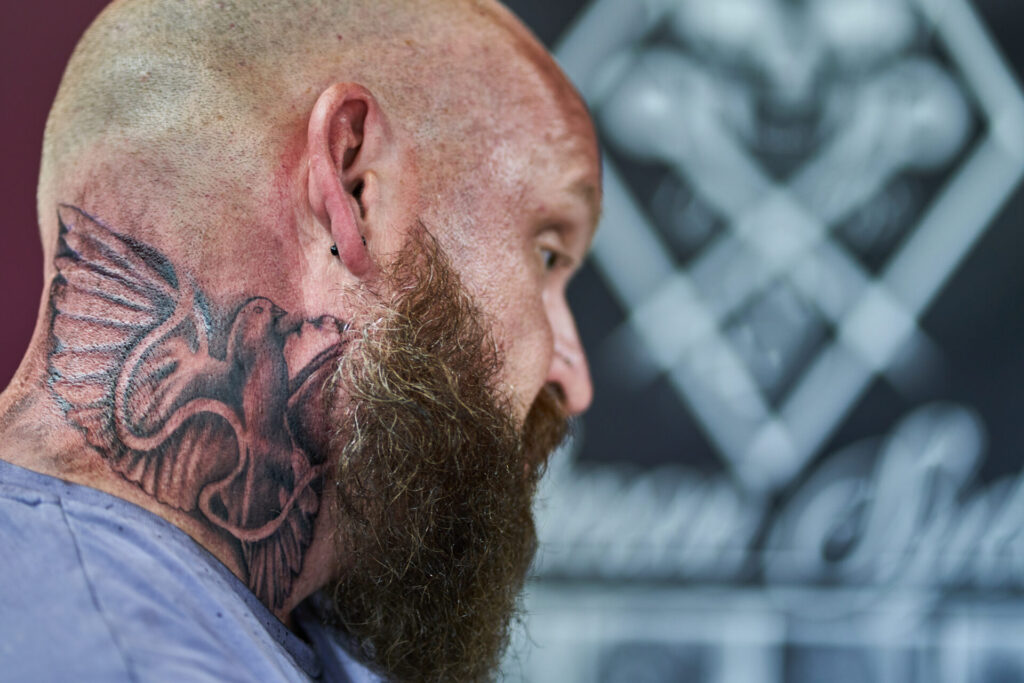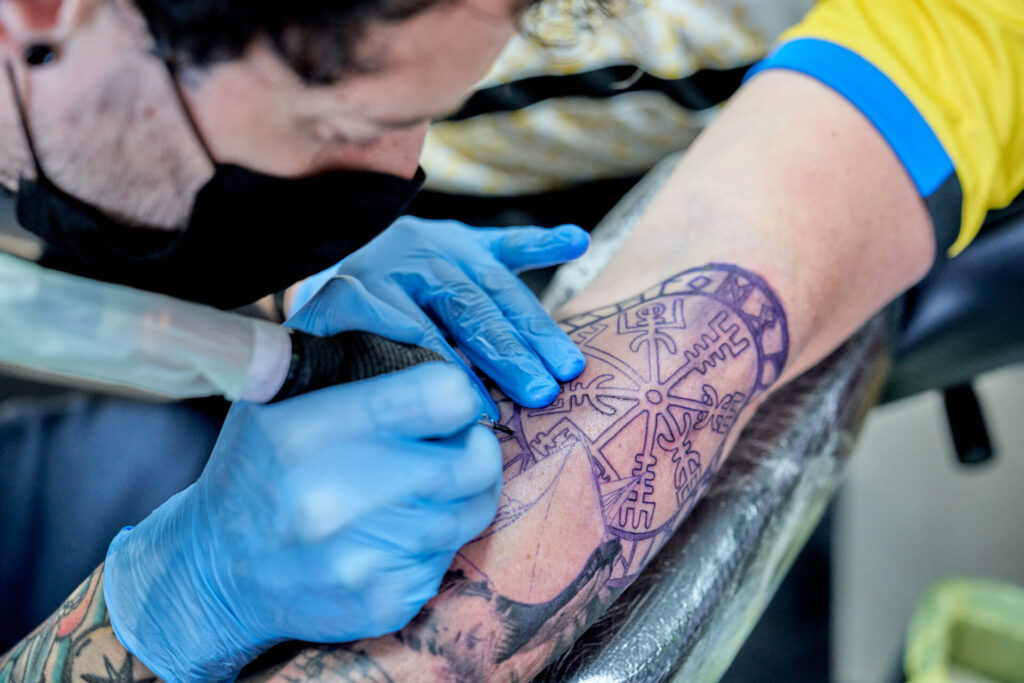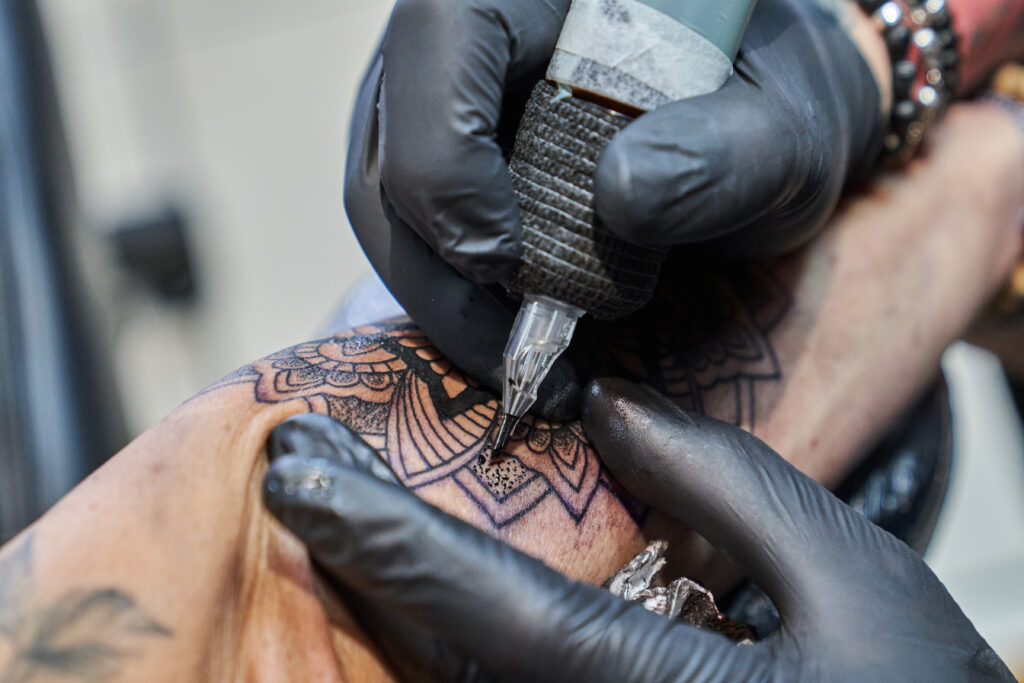“Are Hand tattoos going to be a job-killer?”
They’ve been around for over 3,000-years and remain one of the most controversial talking points of ink for tattooists and customers alike. There’s no doubt that as we become more accustomed to the popular trend for visible body art, that there ‘may’ just be a smidgeon of greater acceptance and a reduction on judgemental prejudice towards these types of tattoos. This month, we’re taking this controversial subject and interviewing a couple of Norwich’s renowned tattooists, Simon Syder and Steven Gigli, who run Black Dagger Tattoo Norwich, and asking the question
As far back as Ancient Egypt, hand tattoos were commonplace. Why? Well we’re not quite sure, but historians have documented a number of hypothesis over the years and the Smithsonian Museum in their ‘The Ancient and Mysterious History’ article, attribute tattoos to have been anything from prostitute symbolism, a desire for Christian burials during the crusade and historical value sunk deeply in Sikh and Hindu religious culture, where Mendhi henna tattoos a sacred part of pre-wedding rituals. The tattooed right hand of a Chiribaya mummy is on display in the El Algarrobal Museum, Peru, that date back to a period of between A.D. 900 to 1350 and is proof that the concept of visible hand tattoos is nothing new.
From a 20th century perspective, traditional hand ink was limited to a very niche group of wearers, that included notorious gang members and hardened sailors, who sported what was at the time ‘ground-breaking’ nautical flash designs heavily influenced by legendary 1920’s tattooist, Norman ‘Sailor Jerry’ Collins.
Black Dagger Tattoo Studio in Norwich has exploded onto the scene and now sits as one of the most infamous studios in the Norfolk area, mainly because their six in-house artists are hand-picked to cover every possible genre and the work they output is unquestionably of the highest quality. We caught up with owners Simon and Steve at the end of a manically busy day. Simon didn’t mess with his words as he locked the door and then kicked back into the leather sofa in the reception area of the studio that overlooked their two shining Harley Davidson Motorcycles that are usually found parked outside the shop during the dry months.
“So you want to know about hand tattoos. Has it been an issue for you mate? What do your clients think.?
I didn’t really expect that as an opener, and it put me on the back foot momentarily. Simon knew I’d recently got a hand tattoo and that I’d already been considering extending the small dachshund I was sporting on my left-hand between thumb and forefinger into a bigger hand piece. As a 52-year-old business owner working as a commercial photographer and video producer with clients spanning from Solicitors, accountants, and nationally recognised professional businesses, none of my clients had mentioned it negatively.
In fact, a middle-aged member of senior management working for a design agency had once said to me that there was an almost expectation for people working creatively to be a little bit “rock n roll” and to have tattoos. Going the next step to a full hand of art had given me an ethical dilemma, purely from an aspect of ‘What If.” What if I ever had to shut my business and get a job somewhere? What if I had the ink and I have tattoo regret, which for the benefit of this article, I’ve had once… after putting my faith into a tattooist to ink me with his preferred style and was a pure disaster that resulted in scars and an ongoing laser tattoo removal. As a mature adult with a full arm sleeve, back pieces, and leg tattoos, tattooing the visible hand is really a passage of rights after 20 years of ink. I’m married, with grown up children, my long-term clients engage my services because of the quality of work I produce and the way I conduct myself. They’ve seen my sleeve because I often wear short sleeve T-Shirts for shoots, and I’ve personally never had any negativity because of my ink apart from one uneducated person who commented that my Hindu Swastika on an Indian themed sleeve was offensive and that I shouldn’t have had it done. Simon nodded as I gave him my own thoughts and apologised while he responded to the second customer message that had appeared on his phone in the 5 minutes I’d been with him. These guys were incredibly busy. He looked up from behind his glasses and continued,
“We’re a professional business and in the ink world, reputation is everything. We’ve spent years picking the right people that reflect our brand and we don’t want that damaged. Our artist work for themselves under our roof, but they all adapt the same ethics that we have in place. Before we even consider tattooing anyone on a visible area, there needs to be some serious discussion. We want to avoid tattoo regret because it can open-up a whole world of shit, not only for the person who gets the tattoo, but for the tattoo artist who did the ink. We don’t want to be responsible for people losing the chance to work or having their lives seriously impacted over making a rash decision to get a piece of artwork that’s going to stop them getting a job or turning up to work one day and the boss telling them that it’s not acceptable and sacking them. Hand tattoos are probably… No, undoubtedly… the second most frowned upon area of the body to get inked other than the face.” He stopped for a minute and shook his head and smiled, but in a perplexed kind of manner.
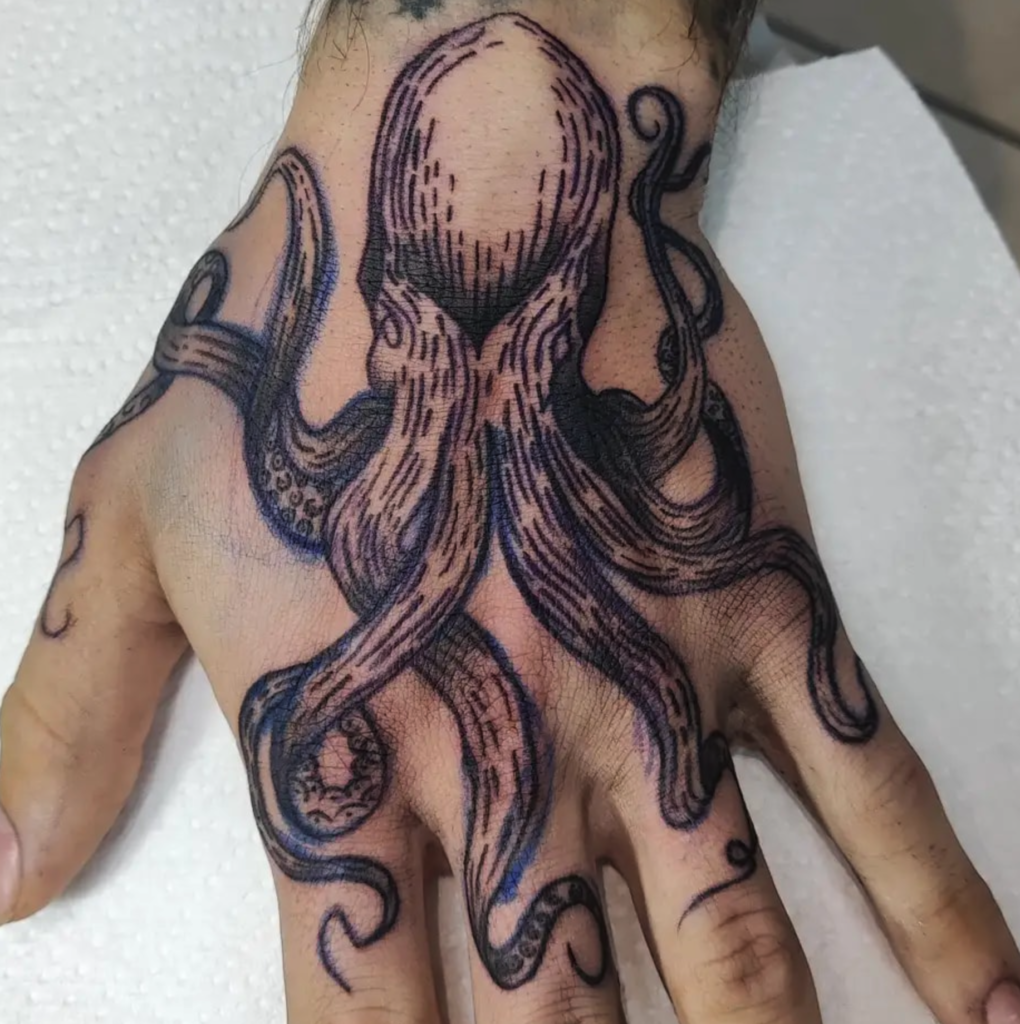
“We call them job-killers in the industry. It’s not a fucking joke, but it’s what they’ve always been known as. I don’t think I need to explain, the answer’s in the title. There are still professional businesses out there who frown on any visible tattoos, and you really can’t hide something that’s on the hand unless you’re going to go around covering up your whole life and you don’t want to be turning up an interview looking like some sort of serial killer in a pair of leather gloves. A lot of tattooists feel that inking the hands is ethically questionable but it’s a massive trend now and a lot of our customers want to be like the people they follow on social media. They see celebs with tattoos and want the same. We offer the service. We will ink hands but under but under a certain set of terms and not unless we’re 110% that the person has made the right decision and is aware of the consequences. I mean, why would we refuse.”
“We tattoo people for a living and while we do this job because it’s the best career in the world, we’re also here to earn a living and put food on the table for our families. If we don’t, customers will just go off and get another artist to ink them and if they can’t find anybody reputable, well they’ll just find some unscrupulous mug with a home set up and dirty equipment, which in the long term affects the rep of professional artists. But that’s a conversation for another day. Tattoos are mainstream now. Believe it or not, even disciplined organisations are starting to accept visible ink on people they’re taking on to work for them.”
I’d almost forgotten that Steve was in the studio, sanitising his workstation after his last client, but at this point he casually walked round to the reception desk armed with his disinfectant filled spray bottle in one hand, roll of disposable paper towel in the other. He plonked himself down on the edge of the desk and effortlessly took up the conversation as if the whole thing had been rehearsed.
“Yeah, and… I bet you didn’t know that even the Metropolitan Police and British Army have changed their staffing policies to employ people who have visible tattoos on the necks and hands. I mean, there’s criteria for it like nothing offensive, sexist, violence themed, which is totally understandable, but with so many of the population now inked in the UK, you’re often hard pressed to walk down the street and actually find somebody who hasn’t got a tattoo. In all my years of tattooing, I don’t think there’s ever been so many inked people out there and I do think that having tattoos in general isn’t so much of an issue now for many sectors, but hand ink was always classed as being a bit shady unless you’re working in a creative industry like design or working in fashion or one of the edgy industries. I mean, just look at the night-time economy. Hand tattoos are booming. Go into any bar, nightclub or trendy restaurant and you’ll find shit loads of them, especially on younger people. They’re working in these hipster places while they’re at university or just working in temp jobs and when they try pursuing a solid career, they end up getting knocked back, can’t get employment, and end up coming to see our laser tattoo removal expert to get it sorted. That’s why we vet every hand tattoo customer before we decide whether to take the work and we make sure all our artists who work under our roof follow the same guidelines. It’s about ‘Due Diligence’.”

Steve emphasised those two words to reinforce the severity. “We take a lot of pride in working this way we work and our ethics. It’s why we get so many people through the door come back time after time to see us. They love our work and the people who work here. We’re real, down to earth tattooists, but we’ve got morals to back it up. That’s the difference between a professional studio and some of the pop-up places that are set-up and gone in six months. We see these studios come and go. Everybody thinks they can buy a tattoo machine and be the next Bang Bang or George Burchett….” He let out a laugh and said “You don’t know who they are do you mate?”
He was right. I didn’t have a clue. Steve put down his spray bottle and paper and peeled off his black latex gloves to reveal a tattooed hand. Both Simon and Steve have sleeves and visible hand ink, but it was hardly a surprise. Simon had twenty years of experience in the industry running tattoo studios and Steve had been an accomplished piercing before working for himself for over a decade. Tattooists carry ink like an extension of their skin and nobody bats an eyelid. In fact, I’d really seriously question getting inked by somebody who wasn’t tattooed. That concept just doesn’t sit well with me personally. I was about to speak, but Steve cut in as he was on a roll,
“Let me give you an example. A couple of weeks ago I did a tattoo on this young lad. It was his first tattoo. I’d just finished this dagger on the underside of his arm, and he hadn’t been out the chair for more than two minutes and said he wanted to come in and book in to have his hand done next. I was like ‘slow down mate’ and I had to explain that these type of rash decisions will end up being problematic. We speak with lots of people who maybe want questionable artwork that’s just inappropriate and that we wouldn’t be comfortable inking on any part of the body, let alone visible areas. I don’t know at times, why people even consider some of the designs they ask for. Because we’re like ‘There’s no way I’m prepared to put my name to that. It’d be career suicide.’”
Steve sipped some water from what can only be described as a wellington boot sized glass.” It wasn’t that many years ago that most reputable tattooists wouldn’t touch your hands unless you’d been a regular customer and had a lot of work done and or you had a lot of other tattoos already. It’s all about commitment and it used to be that hand ink was like an extension of a sleeve and the last bit of your body you had done. It’s about being comfortable wearing your own ink and I suppose being able to live with that decision happily. Getting a small piece on your hand for some people might be better than some fucking massive sleeve on their arm on your first trip to the tattooist because whatever way you cut it, a big piece is going to get attention. People seen to be going a bit back to front these days and starting with your hands doesn’t sit comfortably. The downside, like Simon said earlier, is that you can’t cover your hands up, but if you’re walking into an interview or a presentation to a board of directors, a long sleeve shirt will do the trick.”
Simon came straight in again “I’ve got more than one customer, male and female, who run successful, large professional businesses, whose bodies are full of tattoos, but you’d never know because they cover them all up when they’re at work. I’m talking financial and legal based businesses, where appearance is still a big thing and it’s some of these industries that have judgemental perceptions, because the customers have told me, and these customers won’t get hand tattoos because it would damage their professional reputations. You do need to think long and hard about it if you want your hands done.”
As a former Police Sergeant with twelve years working in a regimented work environment, I’d seen a steady rise in visible tattoos in public sector, but I was still intrigued to research hand ink at a Grass roots level to satisfy my own curiosity about how accepting the corporate world is in 2021 from people who I’m not directly involved with. Before the interview, I’d generated a Poll on Linkedin over a 3-day period posing the Question,
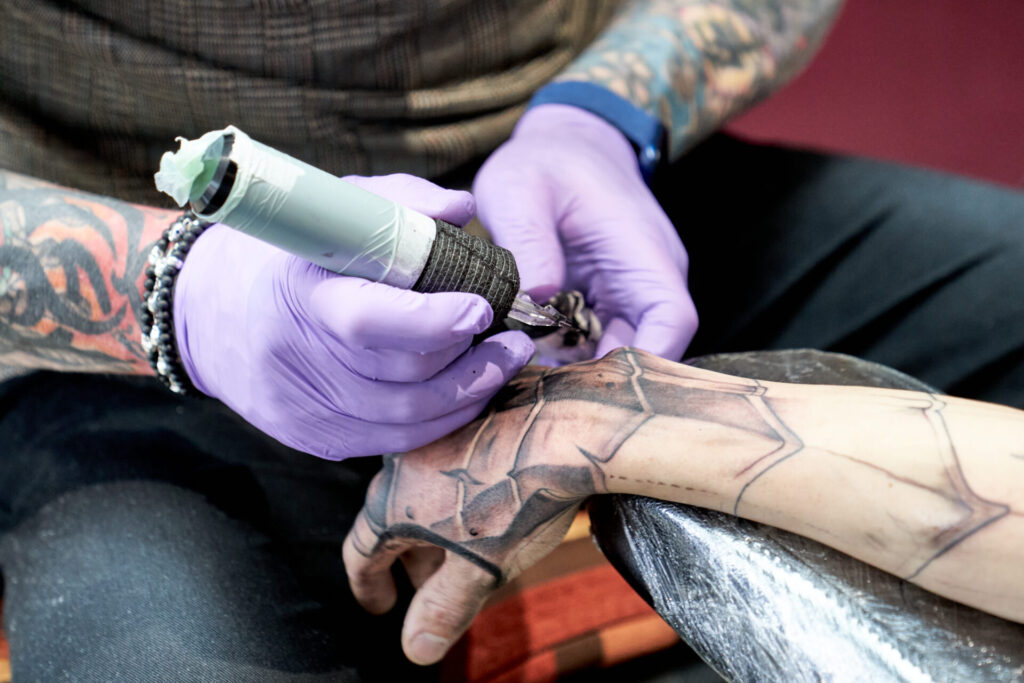

In 2021, does having a hand tattoo affect employment opportunities for potential candidates
We spoke with Rebecca Headen, Recruitment Director of leading East Anglian Recruitment Agency rThirteen, to find out a bit more about how hand art is viewed from a recruitment industry perspective ‘
Hand tattoos and tattoos in general are becoming more and more widely acceptable with employers. There are, of course, some exceptions, and that can depend on the organisation and the brand / client base they are looking to represent / attract. In my experience, if in doubt, disclose it. If it’s a problem for that business, likelihood is you wouldn’t be comfortable working there anyway and there will be another employer who will be happy to celebrate you for your whole self anyways. Personally, I really enjoy people having freedom of expression and showcasing that by having artwork on their skin. It doesn’t make you any less capable of doing great work if you’re skilled and qualified in doing so.
Laura (Wickham) Shaw is a heavily tattooed Digital Media & Communications Creative working at Evoke International. We spoke with Laura in depth about her own experiences with having visible tattoos in the workplace.
I’m split 50/50 with this question. I’ve been given opportunities based on my talent with my tattoos being completely ignored, however I’ve also been in situations where my tattoos have created obstacles. In the past I’ve been asked to cover them up when certain clients arrive on site. The on the flip side of that I have had “keep your tattoos on show…”, due to a tattooed client being on site to be used as an example of how ‘diverse’ the company is. I can’t say either one is favourable as it uses my personal decisions that are rooted in meaning as a means to an end, for that third party, and my individuality shouldn’t be used like that. From the ages of 17 to 30 my tattoos have always been a consideration when applying for positions. From turning up to an interview covered and offered a position to a week later being let go from the temporary position due to the fact of my tattoos becoming public knowledge, usually after seeing me outside of work on my own time. More recently my tattoos have become accepted and seen as expression but from what I can gather it’s from the industry I now work in being more diverse than my previous industries.
Our poll only received only a handful of votes over the three days, although over 420 people viewed the content. I showed the results to Simon as he got up to take his his crash helmet from the nearby table but took my pad on his way and flicked through the stats. “These are really interesting. I think people are still worried about maybe committing with an opinion because of the potential backlash but at the same time, the fact that only 6% of people have given a definite ‘Yes’ answer to whether they think it affects employment chances, says that things may be looking up a bit. Whatever way you look at it, tattoos are here to stay, and we are busier than we have ever been. If employers don’t start looking past the ink and at the potential skills and personal traits of candidates, they’re going to start losing out on some potentially good candidates.”
You can find out more about different hand tattoo styles any other body art, piercing, ink or laser tattoo removal by visiting the Black Dagger Tattoo Norwich website or Facebook Page.
This article was written by Lee Blanchflower, Norwich Commercial Photographer and official Black Danger Tattoo Videographer and Photographer.

